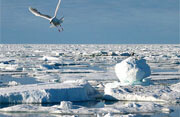The space race may be over, but the war for control of vast Arctic energy resources got a little colder this month when a Russian mini-submarine planted its flag on the seafloor at the North Pole. The Kremlin's grand gesture, intended to signal Russia's reemergence as a geopolitical power player, has instead reminded the world of the Putin administration's quest to reassert state control over Russia's natural resources.
More than a decade ago, Russia's Soviet infrastructure was rapidly sold off for a fraction of its market worth. In recent years, the Russian government has gradually reestablished control over key assets, including oil, gas, and nickel mines. President Vladimir Putin's growth strategy for Russia is based increasingly on natural resource exploitation, an approach that will likely generate millions, if not billions, of dollars in the short-term. As experience elsewhere indicates, relying on resource development for long-term growth has its pitfalls.
In theory, privatization was intended to benefit poor Russians. In reality, industries were quickly bought up by a group of wealthy young Russian businessmen known as the oligarchs. Over the past decade, several of these oligarchs, along with international firms doing business in Russia, have been forced to sell controlling shares of their companies to Kremlin-approved buyers. In many cases, the Putin government relied on threats and bullying to compel these sales. Consequently, most of Russia's natural resources are now owned by state-controlled holding companies.
In a much-publicized case, Mikhail Khodorkovsky, the owner and CEO of Russia's largest privately owned company, Yukos, was sentenced in 2003 to nine years in a Siberian prison for tax evasion and fraud. After Khodorkovsky's arrest, the Yukos empire was divided between two state-controlled energy companies, Gazprom and Rosneft.
Rosneft gained control of the Yukos oil fields in 2004. Its chairman is Putin's deputy chief of staff. Gazprom acquired the Yukos natural gas assets and also acquired oil giant Sibneft, making it the world's third largest holder of oil, with 119 billion barrels in reserves and an economic output comparable to Ireland's GDP. Its chairman is a first deputy prime minister in the government.
Russian oligarchs were not the only obstacles to the Kremlin's nationalization plan. Royal Dutch Shell and its Japanese partners were strong-armed into selling their controlling stake in the Sakhalin II oil field to Gazprom. Another foreign-owned company, TNK-BP, was forced to sell to Gazprom when its license was threatened for not developing its natural gas field quickly enough. "In Russia today, no serious deal can be made without approval from the Kremlin," Irina Y. Yasina, researcher with the Institute for the Economy in Transition, told the International Herald Tribune.
Russian nickel mines have also recently been nationalized. Norilsk Nickel is the world's largest nickel producer. It also mines copper, cobalt, copper, platinum, palladium, and coal in Norilsk, a Siberian village located 1,900 miles north of Moscow. Oligarchs Mikhail Prokhorov and Vladimir Potanin bought Norilsk Nickel for $250 million during the privatization, an investment now worth $31.9 billion. Prokhorov, a multibillionaire playboy, recently experienced the full effects of Putin's drive to control Russia's natural resources.
Arrested on suspicion of offering prostitutes to his guests during a winter getaway in a French ski resort, Prokhorov agreed to sell his 26 percent holding of Norilsk to long-time Putin supporter Vladamir Potanin. "Property rights are very conditional in Russia, to this day," Olga V. Kryshtanovskaya, sociologist at the Institute of Sociology of the Russian Academy of Sciences, told the New York Times. "When the Kremlin considers a capitalist such as Prokhorov no longer acceptable, he is deprived of his property, by one means or another. Private business exists only by the grace of the state."
Russia is on course to become a major economic player in the coming decades. But there is an increasing awareness, fostered by the United Nations Development Programme (UNDP), that economic development is tied to human development. This notion is reflected in the Human Development Index (HDI), a measurement of human well-being that takes into account life expectancy, literacy, education, and standard of living.
The 2007 UNDP National Human Development Report for Russia found that regions with the highest stores of resources and export-driven economies recorded the highest HDIs between 2002 and 2004. Low per capita income and short life expectancy contributed to the low HDI in poorer regions. Growth in Moscow, St. Petersburg, and the oil- and gas-producing regions is not enough to sustain the entire country. "The immense gap between the regions of Russia with regard to the level of human development is slowing down the pace of development of the country as a whole," the report concludes.
Experts predict that the Russian population will shrink by 22 percent (from 143 million to 111 million) by 2050, which translates into a 42 percent loss of its workforce. In addition to low birth rates, Russians face numerous and potentially fatal health problems, including alcoholism, drug abuse, violence, and diseases like HIV/AIDS and tuberculosis.
Russia must also reconcile resource exploitation with G8-mandated environmental protections. The smelters at Norilsk emit 1.9 million tons of sulfur dioxide each year—more than the total yearly emissions of France. As a result, carcinogenic heavy metals show up in the blood and urine of local residents. Aleksei Yablokov, President of the Center for Russian Environmental Policy, argued in 2005 at the Woodrow Wilson Center in Washington, D.C. that the Kremlin's "dirty environmental growth" results in 300,000 to 350,000 extra deaths each year.
Putin's resource-driven strategy has not benefited all, and yet his growth alternatives for resource-poor regions are minimal. Given that it's increasingly accepted internationally that long-term development depends on human and environmental health, Russia is gambling with its future.





